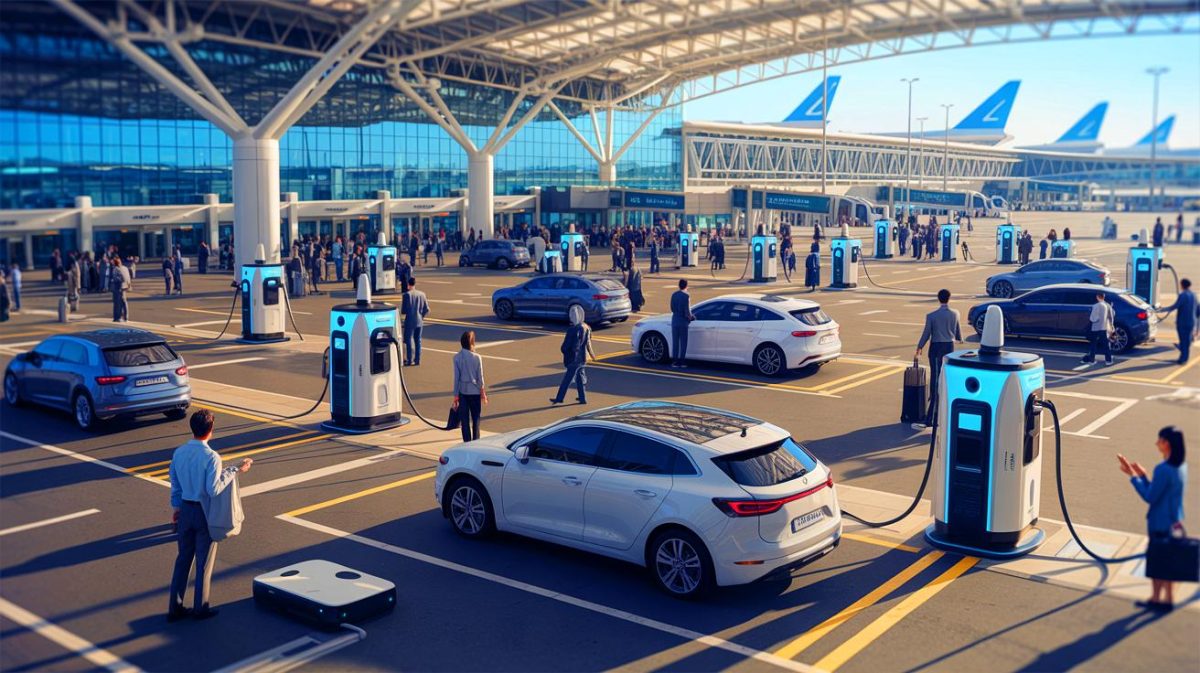| IN A NUTSHELL |
|
In a groundbreaking move, Hyundai Motor Group is taking innovation to new heights at Incheon International Airport. By deploying AI-powered charging robots at one of the busiest airports in the world, Hyundai is setting the stage for a transformative shift in how electric vehicles (EVs) are charged in public spaces. This initiative, part of the Airport 4.0 plan, aims to establish Incheon as a next-generation Aviation AI Innovation Hub. The collaboration between Hyundai and Incheon International Airport Corporation (IIAC) signifies a bold step towards integrating advanced technology into everyday travel experiences, enhancing efficiency, and promoting sustainability.
Charging Smarter, Moving Faster
Hyundai’s AI-powered automatic charging robots (ACRs) are designed to revolutionize the EV charging experience at Incheon Airport. Backed by Hyundai’s extensive robotics expertise and Kia’s system software development, these robots promise to be a game-changer. The goal is to transform the airport into a next-gen “Aviation AI Innovation Hub” as envisioned in the Incheon Airport 4.0 plan. Kia’s R&D center in Hwaseong plays a critical role, focusing on developing connected services that seamlessly integrate with the charging system.
For passengers, this means charging their EVs will be a hassle-free experience, while the airport embraces greener, tech-driven operations. This innovative move demonstrates Hyundai’s commitment to proving how future mobility technologies like robotics and AI can make a tangible difference in everyday settings. Heui Won Yang, head of Hyundai Motor Group’s R&D division, emphasized the project’s significance, stating that it aims to offer a more convenient and enhanced mobility experience through customized automatic charging solutions.
Greener Travel, Robotic Help
Kia’s involvement extends beyond system software development. The automaker is also focusing on building cloud services to support the robots, enhancing their efficiency in complex environments like airports. The ACRs are not just theoretical concepts; they have been tested in real-world conditions, proving their viability. Hyundai previously demonstrated the technology in Seoul’s “robot-friendly building” at Factorial Seongsu, and the airport deployment builds on that experience.
The broader vision includes expanding the ACR deployment to other major transportation hubs, such as seaports and railway stations. This aligns with Hyundai and IIAC’s commitment to supporting electrification and smart mobility infrastructure across South Korea and beyond. Hag Jae Lee, President and CEO of IIAC, highlighted the partnership’s potential to enhance service and operational efficiency at Incheon Airport, contributing to its ambition of becoming the world’s leading digital airport.
Hyundai’s Vision for Future Mobility
The deployment of AI-powered charging robots at Incheon Airport is a testament to Hyundai’s vision for future mobility. This pioneering initiative is not just about technology but also about reshaping the way we travel. Hyundai’s focus on integrating AI and robotics into everyday life underscores its commitment to sustainability and innovation. By collaborating with Kia and IIAC, Hyundai is setting a precedent for how transportation hubs can evolve to meet the demands of a rapidly changing world.
The project also serves as a platform for gathering real-time user feedback, allowing Hyundai and Kia to refine the robots’ hardware and software continuously. These advancements are geared towards creating a seamless and user-friendly experience for EV drivers at the airport. As part of this vision, Hyundai is exploring ways to link the robots with smart parking systems, enhancing their functionality and efficiency.
Looking Ahead: The Road to a Digital Future
As the world moves towards electrification, Hyundai’s initiative at Incheon Airport sets a benchmark for future developments. The collaboration with IIAC is a strategic move to position South Korea as a leader in digital and smart mobility. This project is just the beginning of a broader push to integrate advanced technologies into everyday transportation, paving the way for a more sustainable future.
The success of this initiative could inspire similar projects at other airports and transportation hubs worldwide. By demonstrating the feasibility and benefits of AI-powered charging, Hyundai is not only enhancing its reputation as a leader in innovation but also contributing to a global shift towards greener, more efficient travel.
As Hyundai and its partners continue to push the boundaries of what’s possible, one can’t help but wonder: How will these innovations shape the future of global transportation, and what role will AI and robotics play in the journey ahead?
Did you like it? 4.6/5 (20)









Wow, AI-powered chargers! What’s next, flying cars at the airport? 🚗
Will these robots work with all EV models or just Hyundai and Kia? 🤔
Finally, an airport that charges my car as fast as my phone!
This is fantastic! Can’t wait to see these robots in action. 😊
Are the robots smart enough to find my car in the parking lot too? 😂
How will these charging robots handle the high demand during rush hours?
Bravo Hyundai! Setting the bar for sustainable travel. 🌍